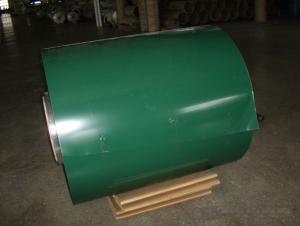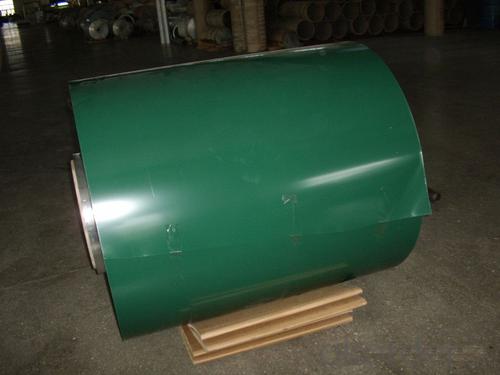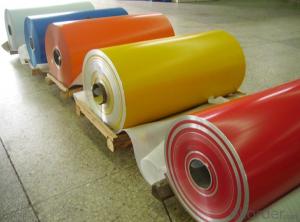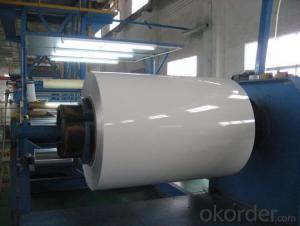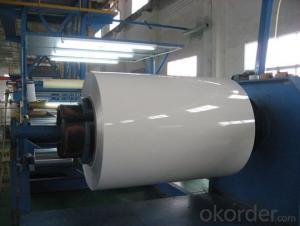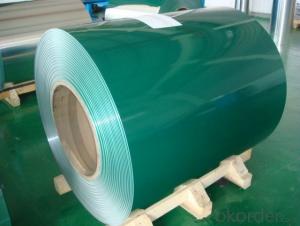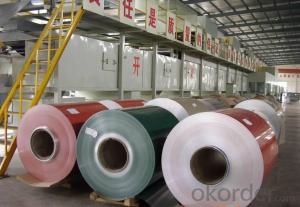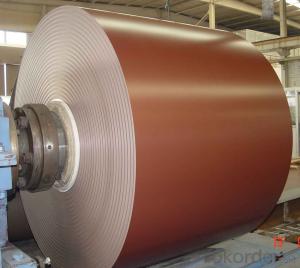Low Price RAL 2012 PVDF 25 Micros Coated Aluminium Coil
- Loading Port:
- Shanghai
- Payment Terms:
- TT OR LC
- Min Order Qty:
- 5 m.t.
- Supply Capability:
- 50000 m.t./month
OKorder Service Pledge
OKorder Financial Service
You Might Also Like
Specification
Description
Product | RAL 2012 PVDF 25 Micros Coated Aluminium Coil | ||
Alloy | 1100, 1145, 1050, 1060, 1070, 3003, 3013, 3005, 3A21,4343,4045, 5052, 5082, 5083, 5086,6061, 8011 etc. | Temper | H12.H14.H16.H18.H22. H24.H26.H32.H34.H36. H38.O etc. |
Thickness | 0.2-7.0mm | Width | Until 2550 |
Painting items | PE and PVDF | Color | All Standards of RAL |
Coil weight | At clients’ requestments | MOQ | 5 tons |
Payment terms | 30% down payment 70% against B/L copy, L/C at sight | ||
Delivery time | 20-30 days after getting your down payment | ||
Package | Wooden Pallet (Customized packing ways are welcomed) | ||
Remarks | The special dimensions can be produced according to clients’ specification | ||
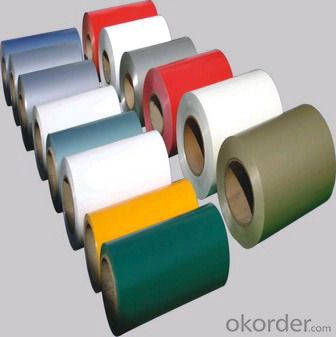
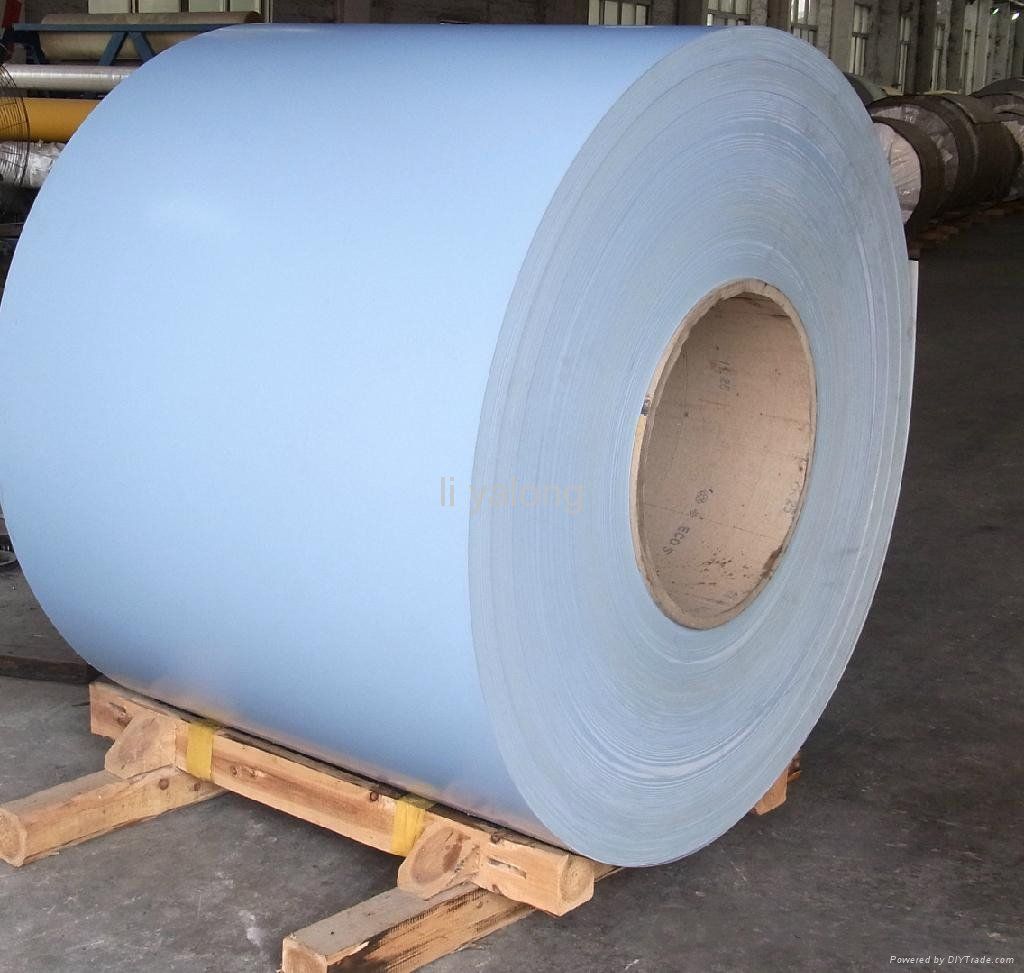
PE and PVDF Painting
Polyester Coatings (PE)
PE (polyester) coatings exhibit an excellent combination of hardness, flexibility, flow, appearance, and superior resistance to dirt retention in indoor and outdoor applications. These coatings are highly resistant to abrasion, metal marking, staining, and marring, and require minimal maintenance. Glazetech uses polyester paints which provide excellent colour and gloss retention properties.
Polyvinylidene Fluoride Coatings (PVDF)
PVDF (polyvinylidene fluoride) is a chemical resistant thick film barrier coating commonly used in architectural applications where both excellent appearance and substrate protection must be maintained over a long period of time. This coating is unaffected by most chemicals and solvents and has excellent wear and abrasion resistance. PVDF also has a high dielectric strength, excellent resistance to weathering and the ability to self extinguish.
Application
Widely used in manufacturing of products as well as other industrial applications like:
Products Materials: PP cap stock, the traffic sign, air-conditioner heat and exchangers, food container, household foil, pharmaceutical packing, cigarettes packing etc.
Building Materials: aluminum curtain wall base plate, ACP, aluminum, ceilings, aluminum sheets, honeycomb panels and aluminum roofing, lighting decoration, household electrical appliances, food package (such as pop can cover & ring-pull), furniture ect.
FAQ
--Q: Do you provide free samples?
--A: Yes, free samples will be sent to you on freight at destination.
--Q: Can I get your latest products catalogue?
--A: Yes, it will be sent to you in no time.
--Q: What is the MOQ?
--A: 2 tons
--Q: What are your payment terms?
--A: We accept L/C, T/T.
--Q: What kinds of alloy can you supply?
--A: 1000 series: 1050, 1060, 1070, 1100, 1145, 1200
3000 series: 3003, 3004, 3105, 3104
5000 series: 5052, 5083, 5754, 5182
6000 series: 6061, 6063, 6062, 6063
8000 series: 8011, 8021
--Q: What kinds of temper can you supply?
--A: O-H112: O,H12,H14,H16,H18,H22,H24,H26,H,32,H34,H111,H112
T3, T4, T6
- Q: Can aluminum coils be used in refrigeration systems?
- Yes, aluminum coils can be used in refrigeration systems. Aluminum is a common material choice for evaporator coils in refrigeration systems due to its excellent heat transfer properties, corrosion resistance, and lightweight nature.
- Q: Can aluminum coils be used in the production of chemical storage tanks?
- Aluminum coils, indeed, have the potential to be utilized in the manufacturing process of chemical storage tanks. Aluminum, being an adaptable and long-lasting material, presents numerous advantages when it comes to chemical storage applications. Its resistance to corrosion renders it suitable for the storage of a vast array of chemicals. Moreover, its lightweight nature facilitates transportation and installation in contrast to materials such as steel. Furthermore, its non-magnetic properties can prove advantageous in certain scenarios. Nevertheless, it is crucial to carefully assess the specific demands of the chemicals being stored and seek advice from professionals or manufacturers to ensure that aluminum is the appropriate choice for the intended purpose.
- Q: How much will be burned out if the soaked and oxidized 5182 aluminum coil is melt down and reprocessed?
- Burn out rate is generally between 1% -2.5%, but that varies among plants as their actual situations are different.
- Q: Can aluminum coils be customized or fabricated into specific shapes?
- Yes, aluminum coils can be customized and fabricated into specific shapes through processes such as bending, cutting, and forming.
- Q: Is it possible to use a metal detector to locate an aluminum coil?
- <p>Yes, you can use a metal detector to detect aluminum coils. Metal detectors are designed to detect various types of metal, including aluminum. While they are often used for detecting ferrous metals like iron, they can also pick up non-ferrous metals such as aluminum. The effectiveness of detecting aluminum may vary depending on the type of metal detector and its sensitivity settings. Ground conditions and the size and composition of the aluminum coil can also affect detection. It's important to adjust the metal detector to the appropriate settings for detecting non-ferrous metals to increase the chances of successful detection.</p>
- Q: How do you store and transport aluminum coils?
- Aluminum coils are typically stored and transported in a variety of ways depending on their size and weight. They are commonly stored in warehouses or outdoor yards, either horizontally on racks or vertically on stands. To prevent damage and ensure stability, aluminum coils are often stacked securely and separated by wooden blocks or spacers. When it comes to transportation, aluminum coils are usually loaded onto flatbed trucks or shipping containers. They may be secured with straps or chains to prevent movement during transit and to ensure their safe delivery to the desired destination.
- Q: How do aluminum coils perform in high humidity environments?
- Aluminum coils perform well in high humidity environments due to their inherent resistance to corrosion. Unlike many other metals, such as iron or steel, aluminum does not rust when exposed to moisture. This makes it a suitable choice for applications where high humidity is a concern, such as air conditioning systems or refrigeration units. The corrosion resistance of aluminum is primarily due to the formation of a thin layer of aluminum oxide on its surface when exposed to oxygen. This oxide layer acts as a protective barrier against further oxidation, preventing the metal from deteriorating even in humid conditions. Moreover, the lightweight nature of aluminum allows for better heat transfer and energy efficiency in cooling systems. This property makes aluminum coils a popular choice as heat exchangers, as they can effectively transfer heat from the air or fluid passing through them. Additionally, aluminum coils are typically coated with a protective layer or treated with a corrosion-resistant coating to further enhance their performance in high humidity environments. These coatings provide an extra layer of protection against moisture and other corrosive elements, ensuring the longevity and reliability of the coils. In summary, aluminum coils are highly suitable for high humidity environments due to their resistance to corrosion and their efficient heat transfer properties. The combination of these factors makes them a reliable choice for various applications where moisture is a concern.
- Q: Are aluminum coils suitable for aerospace applications?
- Yes, aluminum coils are suitable for aerospace applications. Aluminum is a widely used material in the aerospace industry due to its excellent properties such as lightweight, high strength-to-weight ratio, corrosion resistance, and good thermal conductivity. These properties make aluminum coils ideal for various aerospace applications, including aircraft structures, wings, fuselage, and engine components. Additionally, aluminum coils can be easily formed into different shapes and sizes, allowing for efficient manufacturing and customization. Overall, the use of aluminum coils in aerospace applications helps to improve fuel efficiency, reduce overall weight, and enhance performance and durability in challenging environments.
- Q: How can you tell the difference between aluminum and other non-magnetic metals, such as what I've heard called, pot-metal?
- An aluminum bat hits a ball futher than a wooden bat since of the way the wooden bat bends when the ball makes contact, the wooden bat has a sweet spot while the metal one doesn't really have that spot but doesn't break like it's wooden counterpart so the metal bat gives the ball more pop.
- Q: Are aluminum coils suitable for food packaging?
- Yes, aluminum coils are suitable for food packaging. Aluminum is a safe and widely used material for packaging food due to its excellent barrier properties, resistance to corrosion, and ability to maintain the freshness and quality of the packaged food products.
Send your message to us
Low Price RAL 2012 PVDF 25 Micros Coated Aluminium Coil
- Loading Port:
- Shanghai
- Payment Terms:
- TT OR LC
- Min Order Qty:
- 5 m.t.
- Supply Capability:
- 50000 m.t./month
OKorder Service Pledge
OKorder Financial Service
Similar products
Hot products
Hot Searches
Related keywords
